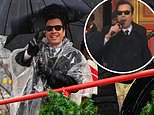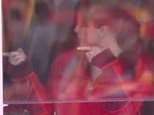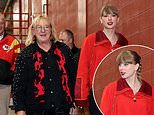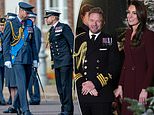This is the dramatic moment Islamist insurgents in Syria toppled a statue of President Bashar al-Assad's brother after they stormed Aleppo in what is a major setback for the government.
Meanwhile, Russia has in response launched air strikes into the Syrian city for the first time since 2016.
Thousands of Syrian insurgents fanned out inside Aleppo in vehicles with improvised armor and pickups, deploying to landmarks such as the old citadel on Saturday, a day after they entered Syria's largest city facing little resistance from government troops.
Syria's armed forces said in a statement Saturday that to absorb the large attack on Aleppo and save lives, it has redeployed and is preparing for a counterattack.
Insurgents were filmed outside police headquarters, in the city center, and outside the Aleppo Citadel.
They tore down posters of Syrian President Bashar al-Assad, stepping on some and burning others.
In footage posted to X, rebels can be seen tearing down the statue of the president's brother Bassel al-Assad, who died in a car crash in 1994.
The video shows how insurgents manage to yank at the statue by tying it to rope that is attached to a moving truck.

Footage captured the dramatic moment Islamist rebels in Syria toppled a statue of President Bashar al-Assad's brother as they stormed Aleppo

The video shows how insurgents manage to yank at the statue by tying it to rope that is attached to a moving truck

As the figure topples over and smashes onto the hard floor, rebels can be heard cheering and chanting as they fire gunshots into the air
As the figure topples over and smashes onto the hard floor, rebels can be heard cheering and chanting as they fire gunshots into the air.
Cars driving by join in on the celebration as they honk their horns.
Other videos documenting the rebellion have been shared online too.
One clip shows how men dressed in camouflage uniforms holding weapons pull down the Syrian flag from a monument in Aleppo.
The surprise takeover is a huge embarrassment for al-Assad, who managed to regain total control of the city in 2016, after expelling rebels and thousands of civilians from its eastern neighborhoods following a grueling military campaign in which his forces were backed by Russia, Iran and its allied groups.
Aleppo has not been attacked by opposition forces since then.
The 2016 battle for Aleppo was a turning point in the war between Syrian government forces and rebel fighters after 2011 protests against al-Assad's rule turned into an all-out war.
The push into Aleppo followed weeks of simmering low-level violence, including government attacks on opposition-held areas.

Rebel forces have been advancing in Aleppo amid reports that they have taken control over most of the city
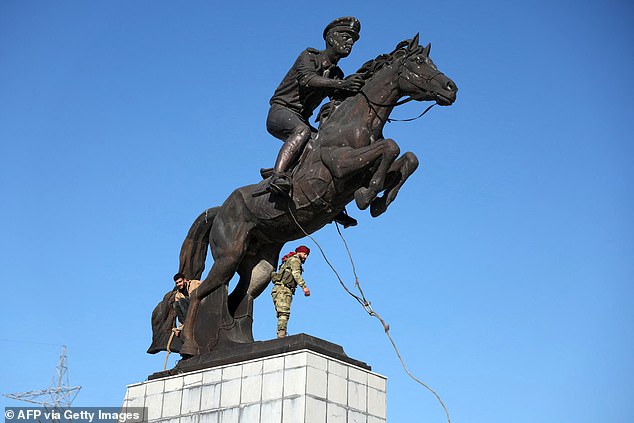
Anti-government fighters prepare to topple the equestrian statue of Bassel-al-Assad, the eldest son of late Syrian president Hafez al-Assad, who was killed in a car crash in 1994, in central Aleppo on November 30, 2024

Anti-government fighters celebrate in a street in Maaret al-Numan in Syria's northwestern Idlib province on November 30
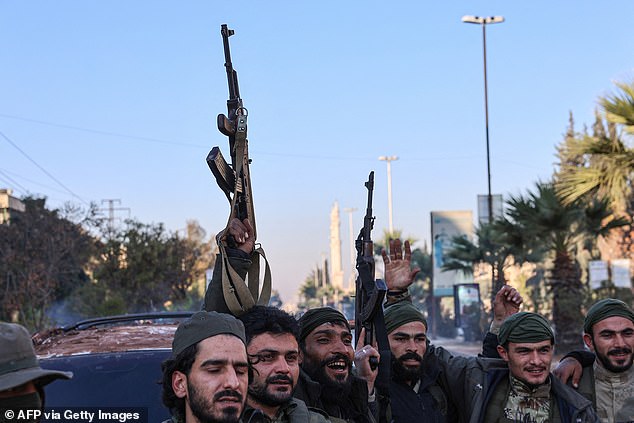
Anti-government fighters celebrate in Aleppo, after jihadists and their allies entered the northern Syrian city
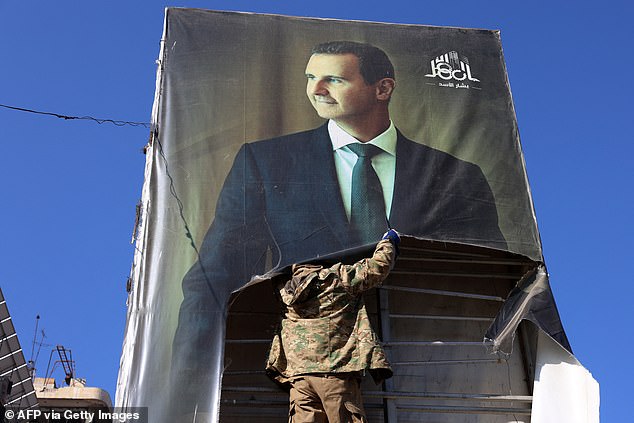
An anti-government fighter tears down a portrait of Syria's President Bashar al-Assad in Aleppo
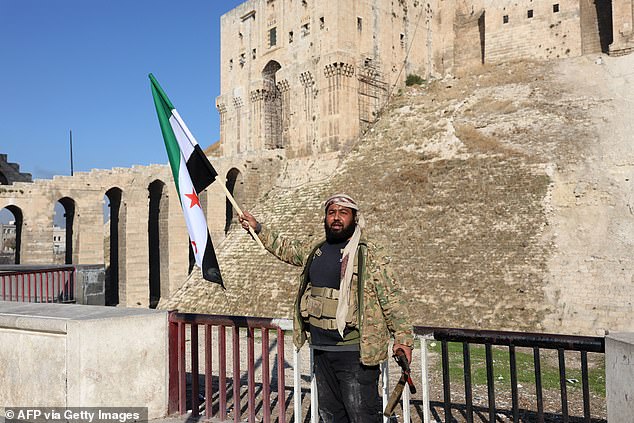
An anti-government fighter raises an opposition flag in front of the landmark citadel of Aleppo
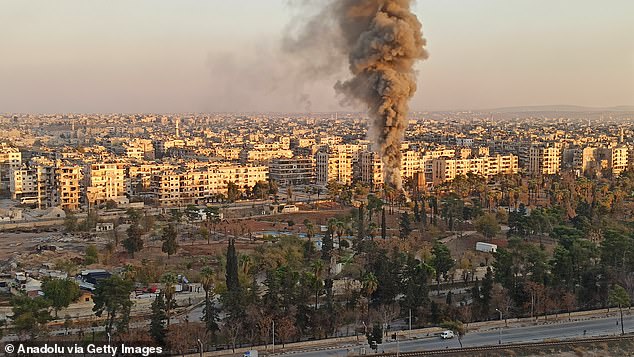
Smoke rises from the area following an airstrike on Aleppo, Syria on November 30
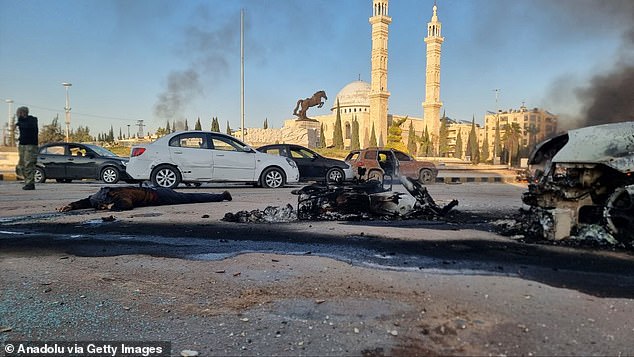
A general view of the destruction following an airstrike on Aleppo, which the Syrian Observatory for Human Rights says was laucnhed by Russia
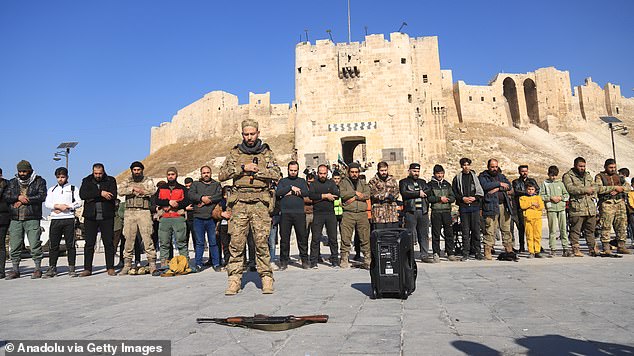
Members of the armed group opposing Syrian President Bashar al-Assad's regime perform Islamic prayer at Aleppo Castle after they seized control of much of Aleppo's city center in Syria

Anti-government fighters kneel to pray in a street in Aleppo, after jihadists and their allies entered the northern Syrian city
Turkey, which has backed Syrian opposition groups, failed in its diplomatic efforts to prevent the Syrian government attacks, which were seen as a violation of a 2019 agreement sponsored by Russia, Turkey and Iran to freeze the line of the conflict.
Mustafa Abdul Jaber, a commander in the Jaish al-Izza rebel brigade, said their speedy advance had been helped by a lack of Iran-backed manpower to support the government in the broader Aleppo province.
Iran's allies in the region have suffered a series of blows at the hands of Israel as the Gaza war has expanded through the Middle East.
Iranian Foreign Minister Abbas Araqchi, in a phone call with his Syrian counterpart on Friday, accused the United States and Israel of being behind the insurgent attack.
The opposition fighters have said the campaign was in response to stepped-up strikes in recent weeks against civilians by the Russian and Syrian air forces on areas of Idlib province, and to preempt any attacks by the Syrian army.
Opposition sources in touch with Turkish intelligence said Turkey, which supports the rebels, had given a green light to the offensive.
Turkey's foreign ministry said on Friday that the clashes between rebels and government forces had resulted in an undesirable escalation of tensions.
Meanwhile, a Syrian war monitor said today that rebels had seized Aleppo's civilian airport - the first time they have taken such a facility - along with key towns in Idlib and Hama provinces as they waged a dayslong offensive.
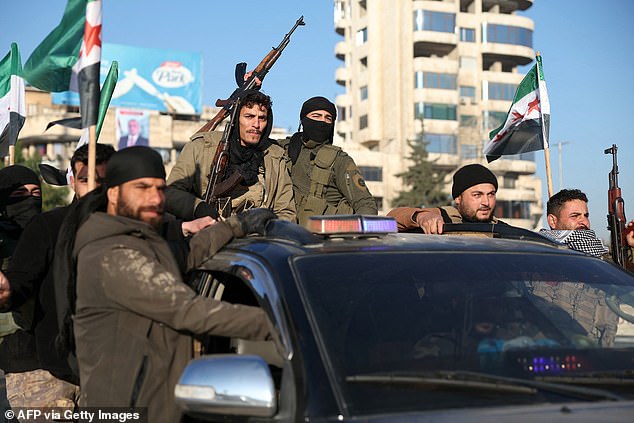
Anti-government fighters brandish their guns as they ride a vehicle in Syria's northern city of Aleppo
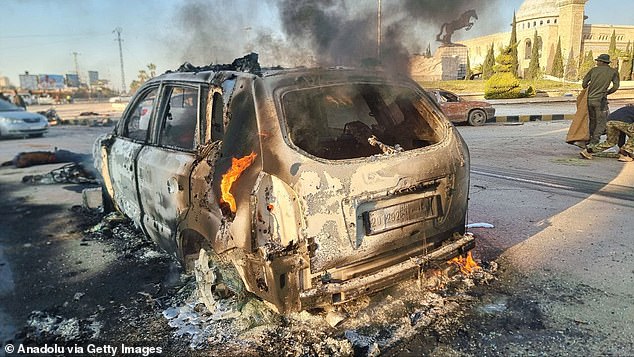
Image shows the destruction caused following an airstrike on Aleppo

A Syrian opposition fighter takes a picture of a comrade stepping on a portrait of Syrian President Bashar al-Assad in Aleppo, early Saturday
Hayat Tahrir al-Sham and allied factions 'took control of the Aleppo international airport' on the city's southeastern outskirts after government forces withdrew, the Syrian Observatory for Human Rights said, adding that rebels also advanced in Hama and Idlib provinces, taking control of 'dozens of strategic towns without any resistance'.
The offensive came as Iran-linked groups, primarily Lebanon's Hezbollah, which has backed Syrian government forces since 2015, have been preoccupied with their own battles at home.
A ceasefire in Hezbollah's two-month war with Israel took effect Wednesday, the day the Syrian opposition factions announced their offensive.
Israel has also escalated its attacks against Hezbollah and Iran-linked targets in Syria during the last 70 days.
Witnesses said two airstrikes on the city's edge late Friday targeted insurgent reinforcements and hit near residential areas. A war monitor said 20 fighters were killed.
More than 300 people have been killed since fighting broke out on Wednesday, according to a war monitor.
It comes as the Syrian army said today said that dozens of its soldiers had been killed in a major attack by rebels.
Russia has launched air strikes on part of Aleppo in response - the first since 2016 - according to the Syrian Observatory for Human Rights.
The surprise rebel offensive has put the 13-year-long Syrian war back into the spotlight.
The conflict has killed an estimated half-million people, while some 6.8 million Syrians have fled the country, a refugee flow that helped change the political map in Europe by fueling anti-immigrant far-right movements.
The roughly 30% of the country not under al-Assad is controlled by a range of opposition forces and foreign troops.
The U.S. has about 900 troops in northeast Syria, far from Aleppo, to guard against a resurgence by the Islamic State.
Both the U.S. and Israel conduct occasional strikes in Syria against government forces and Iran-allied militias.
Turkey has forces in Syria as well, and has influence with the broad alliance of opposition forces storming Aleppo.
Coming after years with few sizeable changes in territory between Syria's warring parties, the fighting 'has the potential to be really quite, quite consequential and potentially game-changing,' if Syrian government forces prove unable to hold their ground, said Charles Lister, a longtime Syria analyst with the U.S.-based Middle East Institute.
































